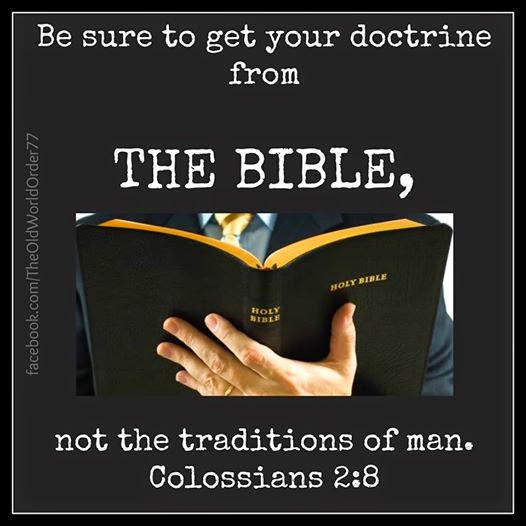Protestants claim the Bible is the only rule of faith, meaning that it contains all of the material one needs for theology and that this material is sufficiently clear that one does not need apostolic tradition or the Church’s magisterium (teaching authority) to help one understand it. In the Protestant view, the whole of Christian truth is found within the Bible’s pages. Anything extraneous to the Bible is simply non-authoritative, unnecessary, or wrong—and may well hinder one in coming to God.
Catholics, on the other hand, recognize that the Bible does not endorse this view and that, in fact, it is repudiated in Scripture. The true "rule of faith"—as expressed in the Bible itself—is Scripture plus apostolic tradition, as manifested in the living teaching authority of the Catholic Church, to which were entrusted the oral teachings of Jesus and the apostles, along with the authority to interpret Scripture correctly.
In the Second Vatican Council’s document on divine revelation, Dei Verbum (Latin: "The Word of God"), the relationship between Tradition and Scripture is explained: "Hence there exists a close connection and communication between sacred Tradition and sacred Scripture. For both of them, flowing from the same divine wellspring, in a certain way merge into a unity and tend toward the same end. For sacred Scripture is the word of God inasmuch as it is consigned to writing under the inspiration of the divine Spirit. To the successors of the apostles, sacred Tradition hands on in its full purity God’s word, which was entrusted to the apostles by Christ the Lord and the Holy Spirit.
"Thus, by the light of the Spirit of truth, these successors can in their preaching preserve this word of God faithfully, explain it, and make it more widely known. Consequently it is not from sacred Scripture alone that the Church draws her certainty about everything which has been revealed. Therefore both sacred Tradition and sacred Scripture are to be accepted and venerated with the same devotion and reverence."
But Evangelical and Fundamentalist Protestants, who place their confidence in Martin Luther’s theory of sola scriptura (Latin: "Scripture alone"), will usually argue for their position by citing a couple of key verses. The first is this: "These are written that you may believe that Jesus is the Christ, the Son of God, and that believing you may have life in his name" (John 20:31). The other is this: "All Scripture is
inspired by God and profitable for teaching, for reproof, for correction, and for training in righteousness; so that the man of God may be equipped, prepared for every good work" (2 Timothy 3:16–17). According to these Protestants, these verses demonstrate the reality of sola scriptura (the "Bible only" theory).
Not so, reply Catholics. First, the verse from John refers to the things written in that book (read it with John 20:30, the verse immediately before it to see the context of the statement in question). If this verse proved anything, it would not prove the theory of sola scriptura but that the Gospel of John is sufficient.
Second, the verse from John’s Gospel tells us only that the Bible was composed so we can be helped to believe Jesus is the Messiah. It does not say the Bible is all we need for salvation, much less that the Bible is all we need for theology; nor does it say the Bible is even necessary to believe in Christ. After all, the earliest Christians had no New Testament to which they could appeal; they learned from oral, rather than written, instruction. Until relatively recent times, the Bible was inaccessible to most people, either because they could not read or because the printing press had not been invented. All these people learned from oral instruction, passed down, generation to generation, by the Church.
Much the same can be said about 2 Timothy 3:16-17. To say that all inspired writing "has its uses" is one thing; to say that only inspired writing need be followed is something else. Besides, there is a telling argument against claims of Evangelical and Fundamentalist Protestants. John Henry Newman explained it in an 1884 essay entitled "Inspiration in its Relation to Revelation."
Thursday, May 22, 2014
Subscribe to:
Posts (Atom)

